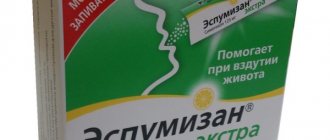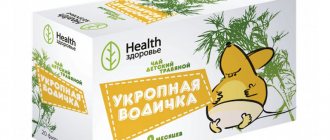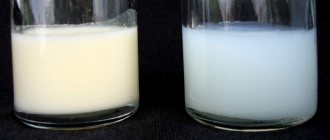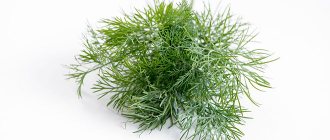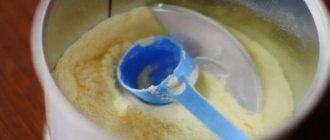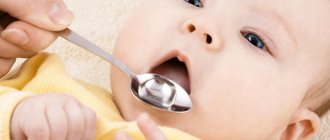With the help of dill water, you can quickly and effectively get rid of infant colic, but in order for this to happen, you need to know how to use this natural remedy and how not to cause complications in the baby’s condition. Read these and other tips for preparing and using dill water in this article.
The first months of a child’s life are incredibly difficult both for the baby himself, adapting to life outside the womb, and for his parents, who are trying in every possible way to facilitate this adaptation.
The situation is also complicated by the fact that starting from 3-5 weeks, the baby may experience so-called colic - pain caused by bloating, during which the baby cries furiously and tightens his legs. An excellent carminative that came to us from the past - dill water - will help cope with excessive gas formation.
Beneficial properties of dill water for children
Dill water is an effective remedy that is used to combat various diseases of the gastrointestinal tract, but it is best known for its active use in newborns suffering from colic.
The effect of this natural medicine is to relieve spasms, which promotes the release of gases accumulating in the intestines. Thus, thanks to dill water, you can get rid of bloating, colic and flatulence.
Dill water
In addition, dill water helps improve digestion, which is very important for the baby’s immature digestive system, and also has an antimicrobial effect.
Being a natural remedy, dill water does not cause side effects, like many medicinal suspensions used to combat colic.
Preparation of dill water for newborns
Despite its name, dill water is not prepared from dill at all, but from its relative - fennel. The seeds of this plant are collected, dried and used in the pharmaceutical industry as a digestive aid.
Many mothers use regular garden dill as an ingredient in dill water and claim that it has the same effect as fennel.
The traditional component of dill water is fennel, but dill is also actively used for this.
Dill water can be purchased ready-made in the prescription department of pharmacies. But since not everywhere there are such departments and it is sometimes problematic to purchase a ready-made remedy, you can prepare a carminative drug yourself. One of the following components is suitable for this:
- fennel essential oil
- fennel tea
- fennel seeds
- Dill seeds
Fennel seeds
Depending on which component you will use, there are several recipes for preparing dill water:
- Based on essential oil - 1 liter of distilled water requires 1 ml of fennel oil, which can be measured using a sterile syringe. 2. Based on dill seeds - pour a teaspoon of dill seeds or greens with a glass of boiling water and leave the mixture for an hour, after which the mixture must be strained 3. Based on fennel seeds - 2-3 g of crushed seeds, pour 250 g of boiling water and leave for 1 hour , then filter through a fine sieve 4. Preparing tea - 1 bag of fennel tea is poured with a glass of boiling water and left until completely cooled.
Fennel tea
It is important to use only distilled or special baby water when preparing dill water, because it will be used for a newborn baby.
Possible contraindications
Dill tea is beneficial when adults use it in recommended doses. If you give a drink to a newborn often and in large quantities, you can harm the child’s body.
The result of uncontrolled use is drowsiness, loss of strength, decreased intestinal activity and other pathological phenomena.
The main contraindication for use is individual intolerance to fennel. It is also prohibited to use the product for diarrhea and low blood pressure.
Parents who doubt the necessity and safety of using the drink should contact their pediatrician. The doctor will tell you whether the child should be given tea and will draw up an optimal dosage regimen.
Although dill tea can be given to newborns, it is contraindicated during pregnancy.
How often should children be given dill water?
Dill water can be used to prevent gas formation and to directly combat it. For the purpose of prevention, dill water is given to the baby three times a day, and if colic occurs, the remedy is given once at a time when the baby experiences pain and problems with the passage of gases, which are accompanied by prolonged crying and bloating.
During colic, the baby cries non-stop
The dosage of dill water for infants is the same in any case: no more than 1 teaspoon of the product should be given at one time. If colic occurs frequently in a child, the frequency of administration can be increased to 6 times a day.
How to use and how many times are you allowed to drink?
Parents are worried, not knowing how often they can give their baby dill water to avoid harm. Colic appears over several months until enzyme production is established and the intestines function stably.
If you need to prevent evening attacks, the product is used between feedings during the day. To relieve colic, two times are enough.
Newborns
A newly born baby can be given dill water on demand . But since attacks of colic occur mainly in the evening and at night, it is not necessary to give it more than four times a day. There are two ways to use dill water for newborns:
- 2-3 teaspoons three to four times a day between feedings. Starting with one half teaspoon.
- You can dilute the infusion in boiled water and give it to your child to drink from a bottle throughout the day. Shake the bottle before each use.
But you always need to start with a small dosage so that the child’s reaction can be seen.
For babies
Water is given to children as long as they are bothered by colic or other tummy problems. As a rule, by 4 months everything returns to normal. Rarely does colic last longer. When the problems go away, you can stop taking dill water. The advantage of the product is that it is not addictive and has a long-lasting effect on the body.
The best option for taking water is to drink it 3 times a day, one teaspoon. Depending on the situation, the dosage can be slightly modified. But after consultation with a pediatrician. We wrote in more detail about the use of dill water for newborns in this article.
For older kids
Since the main substance in fennel oil is anethole, the drug relieves colic in infants. But this is not the only effect of water. The composition contains a large amount of carvone, which is excellent for improving digestion. Water can be taken by both adults and children over one year old . It has many useful properties:
- Helps with flatulence.
- For colds, it improves sputum discharge.
- Promotes healing of ulcers and wounds.
- Eliminates inflammation.
- Has a diuretic effect.
How to give dill water to a baby?
Dill water is given to babies from the second week of life. Of course, such a small child will not be able to drink the product from a spoon, so you can give dill water to your child like this:
- mix into a small amount of expressed breast milk or formula in a bottle with nipple
- pour the product itself into a bottle (teaspoon) without mixing with anything
- try to give the remedy from a sterile syringe
Dill water can be mixed with milk or infant formula.
If the child willingly agrees to drink dill water in its pure form, then it must be given between feedings or before meals.
How to prepare medicine from dill
Pharmacy drugs in this case are in no way superior to homemade medicine. If you follow the rules of hygiene and the recipe, you can safely give homemade dill water to your baby and take it yourself.
It won’t be difficult for mom to prepare a decoction:
- Pour a full tablespoon of seeds into a glass of boiling water.
- Leave for 15 minutes covered.
To make medicine from fresh herbs, you will need a tablespoon of chopped herbs and half a liter of boiling water.
Making fennel water is even easier:
- Buy fennel oil at the pharmacy.
- Add one or two drops of oil to a liter of water.
Is it possible to drink a more concentrated solution? No, while you are breastfeeding, strictly adhere to the recipe. Fennel oil is concentrated; excess of its substances can harm you and your baby.
If you like the taste of fresh dill, you can eat it when your baby is ten days old.
The infusion is stored in the refrigerator for no more than 30 days in a glass container with a tight-fitting lid.
How long does dill water last?
The beneficial properties of dill water are preserved for 30 days, provided that it is stored in the refrigerator.
This applies to products purchased at the pharmacy, but dill water prepared independently can “last” for so long only if it was prepared under conditions of absolute sterility, which is almost impossible.
For your baby, it is best to prepare new dill water every time - this way it will not lose its properties and will bring maximum benefits.
In addition, the preparation process is simple and convenient, so there is no need to prepare the product once a month and expose the fragile body to danger.
Reviews of dill water
We were the only one who saved ourselves! It didn’t take anything, but the dill did just fine. I also gave it from two weeks, from a bottle, and drank it myself. She didn’t follow the dosage, how much she drank. Try it, maybe it will help you!
Ritulechka
https://www.babyblog.ru/community/post/01medicina/1697353
Well, to be honest, this is one of the “something needs to be done” series. There will be temporary relief. but in general the colic will go away on its own later.
Cookie
https://www.babyblog.ru/community/post/01medicina/1697353
I gave my eldest son dill water instead of regular water, every day, and did not suffer from colic at all. Now we are expecting a daughter, I plan to do the same again, soon the dill will begin to dry, we will collect it just in time for the birth.
Lyudmila
https://www.baby.ru/blogs/post/12806346–5937481/
Why is an overdose of dill water dangerous?
- Although dill water is a completely natural product, significant consumption of it still has negative consequences.
- If you give your baby an increased dose of dill water or repeat the dose too often, this can lead to loose stools and too much gas.
- There is also an opinion that dill water in large quantities helps lower blood pressure
With an overdose of dill water, colic may intensify
. Therefore, you should not overdo it with the use of the remedy, because an immature child’s body can react to it differently, and if colic does not go away after using dill water and relief does not occur within half an hour, then this remedy is simply not suitable for the child. is suitable and should be preferred to other carminative drugs.
Harm, side effects and allergies
If the drug is used too often, adverse reactions may occur.:
- diarrhea;
- low blood pressure;
- excessive gas formation;
- allergic skin reaction.
With cholelithiasis, there is a high probability of blockage of the biliary tract, resulting in intense pain in the right hypochondrium and attacks of vomiting.
Contraindications
A drink made from fennel seeds has few contraindications. Do not take the product if :
- individual intolerance to dill and fennel;
- cholelithiasis;
- children up to 2 weeks of age.
Overdose
Dill water is a generally harmless drink; the unpleasant consequences of an overdose are rarely pronounced. Common symptoms of overuse:
- urge to vomit;
- diarrhea;
- spasmodic pain in the abdomen.
If these symptoms occur, taking the medicinal drink must be interrupted . After the condition has normalized, drinking water can be resumed, but with strict adherence to the recommended dosage.
Allergy in newborns to dill water
Very rarely, a child may develop an allergic reaction to dill water. As a rule, it manifests itself in the form of a traditional rash, red spots on the body, but other symptoms may also occur:
- vomit
- flatulence
- loose stool
- swelling of the mucous membrane
Manifestation of allergies in the form of pimples on the face
- If such symptoms occur, it is necessary to stop giving the baby the remedy and switch to another drug for colic that does not contain fennel or dill.
- Such an allergic reaction may occur due to the fact that the child’s digestive system is very immature and it is difficult for it to cope with certain substances that are not broken down and absorbed due to poor production of the necessary enzymes
- We should also not forget that dill, like fennel, is a plant capable of extracting heavy metals and other substances from the soil that are present in the soil on which the plant grows. They can cause poisoning, which will also be accompanied by vomiting and loose stools.
Contraindications to taking dill water
In order for dill water to have only positive consequences, parents must strictly control the dosage.
The cheapness and naturalness of dill water sometimes push parents to extremes in its use. For example, many compassionate mothers begin to fear colic like hell and, to prevent it from occurring, give the child dill water instead of regular water.
This is strictly forbidden: dill water is a medicine and there should be no uncontrolled use of this drug.
Since each body reacts differently to both food and medications, it is worth considering the possibility of individual reactions when monitoring the child’s condition after taking dill water.
If the mother notices changes in stool, rashes, or strange behavior in the child, the drug should be discontinued and consult a pediatrician.
What does it help with?
Why do mothers give this water to their babies? Dill water made from fennel is very useful for children . It has a beneficial effect on the digestive system. Relieves the baby from bloating, constipation and intestinal colic. It also has an antispasmodic effect.
The composition of fennel is varied. It includes:
- iron;
- phosphorus;
- vitamins B and C;
- nicotinic and folic acids.
What effect does it have on the body?
Preparations based on fennel and dill have many beneficial properties. They are given to newborns and young children in many cases. Dill water has a healing effect on the body:
- Clears it of putrefactive formations.
- Reduces pressure on the intestinal walls.
- An excellent diuretic.
- Relieves inflammatory processes.
- Normalizes heart function.
- Improves appetite.
- Helps with constipation.
- Copes with the removal of gases in infants.
- Increases lactation in nursing women.
If you regularly give your baby dill water, he will be relieved of pain, and the digestion process will be improved. As a rule, after taking dill water, gases begin to come out with a loud sound, and the baby calmly falls asleep.
Benefits of pharmaceutical products
The medicine is sold in pharmacies in dark bottles. The purchased product contains water and dill oil .
- This remedy improves the digestion of foods in a child.
- It also has antimicrobial properties and helps with minor inflammation of the respiratory tract.
- Promotes expectoration of mucus.
- Pediatricians also prescribe dill water in the treatment of flatulence.
Plantex also helps with excessive gas formation in infants . The product is in great demand among parents. The effect of its use is like dill water.
There are practically no differences between a purchased product and one prepared at home. Any mother can prepare a remedy for her baby on her own. But in pharmacy departments, water is prepared under sterile conditions, and this is important for an infant. And the extract is mixed, not the seed, thanks to this the shelf life is up to one month.
How to give dill water to infants: tips and reviews
Dill water is a time-tested remedy that has proven its effectiveness over more than one generation. But lately there has been more and more talk that the effectiveness of dill infusion is exaggerated.
According to many doctors, a carminative can occur from drinking plain water, not necessarily dill. Experts also talk about the greater benefits of raisin water, which contains potassium, which is so necessary for intestinal function.
Disputes about the effectiveness of dill water are baseless if it helps your baby
Whether to believe the assumptions of some doctors or trust the experience of mothers and grandmothers is a personal matter for everyone. If you see a visible effect from dill water and the absence of side effects, then there is no reason not to give this remedy to your baby. The main thing is that the mother should feel calm about her child, and that the baby should feel comfortable exploring the world and developing.
